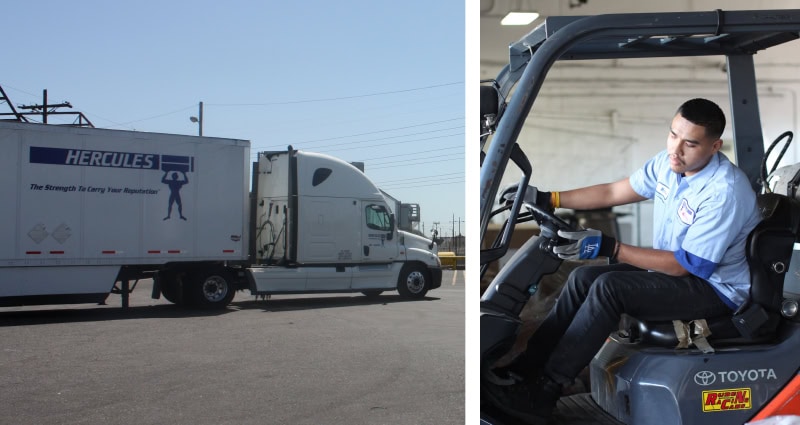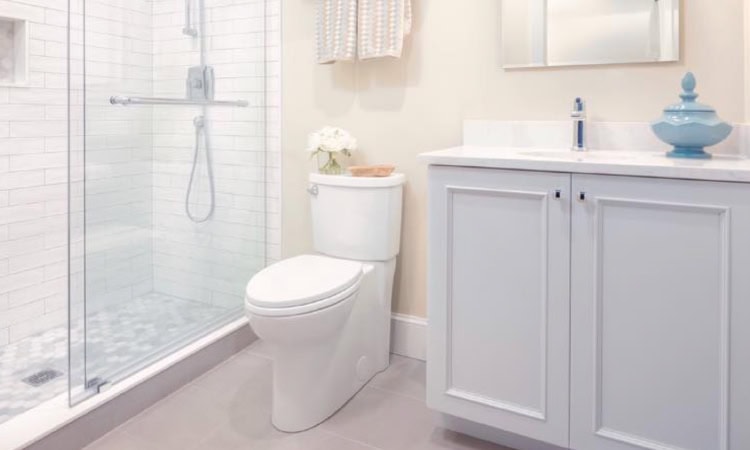American Standard: Flushed With Success

As a leading North American brand, American Standard has been offering innovative products for more than 150 years. One of its products—the humble but essential toilet—is practically synonymous with the company name.
THE CUSTOMER
American Standard is a North American manufacturer of plumbing fixtures headquartered in Piscataway, New Jersey. The brand has been a mainstay in the building industry for the past 150 years.
THE PROVIDER
Hercules Forwarding is an asset-based less-than-truckload (LTL) motor carrier and customs brokerage with Canadian headquarters in New Westminster, British Columbia and U.S. headquarters in Vernon, California. It specializes in U.S.-Canada shipments with a specific focus on transloading solutions.
American Standard produces most of these units in one of four manufacturing plants it operates in Mexico and then ships them to distribution centers in the United States and Canada.
For a long time, the company relied solely on large and direct carriers to ship its product from Mexico. However, constant rate increases were affecting the bottom line.
“In 2005, we decided to go down to Laredo, Texas and see what other options we could find,” recalls Gary Harlow, a leader at Amstan Logistics, the logistics arm of American Standard, Inc.
Transloading is the Solution
That’s when American Standard connected with Vocar Transportation (acquired by Hercules in 2010) and landed on a transloading solution. “We began bringing our freight up to the border with Mexican carriers and then transloading the shipments at Hercules and putting them on U.S. trailers,” Harlow explains.
A practice that wasn’t as prevalent in 2005 as it is today, transloading is the transfer of goods from one mode of transportation to another enroute to its ultimate destination. “A lot of companies transload now,” Harlow notes.
Prior to engaging Hercules, American Standard interviewed several potential candidates. “We actually used two companies for a while—Hercules being one of them—but the other company didn’t do as good a job so we settled on using Hercules only,” Harlow says.
Almost 20 years later, the partnership endures. It has grown to the point that American Standard currently transloads more than half of its cross-border shipments. Transloading not only reduces shipping times but also cuts down on damage claims.
“We set up the operation exactly how American Standard needed it set up,” says John Volpe, who as president of Vocar Transportation oversees Hercules’ Texas operation. “We were flexible and catered to their specific needs.”
It All Starts with Cross-Docking
Theirs is a relationship grounded in distribution. It starts with cross-docking operations at the border in Laredo, Texas. Cross-docking entails unloading goods from vehicles making incoming shipments at a logistics facility and transferring them to vehicles handling outgoing shipments. The point is to incur little or no storage time in between.
“Cost was our major issue,” says Harlow. “If you don’t have options, you’re stuck with whatever capacity and/or pricing you get from the larger carriers. You don’t have a lot of control.”
Door-to-door (D2D) shipping isn’t the only recourse. When American Standard relies on U.S. trailers to ship its product out of Mexico, the order of operations proceeds like this:
1. U.S. trailers are loaded in Mexico.
2. Shipments are transported to the border and are cleared by a customs broker engaged by American Standard.
3. Shipments are dropped in a U.S. carrier’s yard to be delivered within the carrier’s capacity.
Depending on the time of year and capacity constraints, this means a shipment can sit in a designated U.S. carrier’s yard for far longer than American Standard often prefers. And the carriers in question are typically larger and thus more expensive. “Working with Hercules gives us much more flexibility,” says Harlow.
Expanding the Options
Hercules’ cross-docking operations give American Standard more options in regard to choosing carriers to transport shipments from Laredo to its distribution centers (DCs). Hercules typically handles 20 to 25 American Standard truckload trailers daily.
“We load a Mexican carrier’s trailer at our plants,” Harlow explains. “It travels to the border where our customs broker clears the load. Then the trailer gets dropped at Hercules’ facility on the U.S. side.”
American Standard then works with Hercules to transload shipments onto U.S. carriers. Theirs has been an efficient and long-running partnership. “Transloading has meant better pricing and better service,” says Harlow.
The relationship isn’t static either. It has evolved to include Hercules participating in American Standard’s LTL needs on the shipping lanes Hercules can service. “We’re not a nationwide carrier so we can only service them in certain lanes,” Volpe notes.
The relative fragility of American Standard’s product line influences shipping decisions as well. The company manufactures bathroom fixtures in its Mexican plants—mainly toilets and sinks. These items are primarily made of porcelain and require careful packaging. Despite the packaging, minimal handling does much to minimize damage claims.
“Damage doesn’t occur on the initial shipping side of things,” says Harlow. “The LTL side can be a different story.”
American Standard uses all kinds of LTL carriers including large providers such as SAIA and Estes that use various terminals where breakbulk handling occurs. If a shipment is going to incur damage, breakbulk terminals where packages are unloaded and reloaded is the more likely spot.
“We try to minimize the handling of freight by eliminating breakbulks,” says Volpe. “When we ship to the Pacific Northwest (Oregon, Washington) from Texas, the freight travels without being touched. A lot of our competitors have to go through two or three different terminals to get freight to that destination.”
EVOLVING AND ADAPTING

To minimize shipping damage to its main product line—toilets and sinks—American Standard eliminates breakbulk handling so freight travels without being touched.
When Hercules first began cross-docking American Standard’s freight at the border, everything arriving from Mexico was palletized. Then American Standard discovered a cheaper and more efficient way to ship its product: slip sheets.
Made of plastic, heavy laminated kraft paperboard, or corrugated fiberboard, slip sheets are pallet-sized but thinner. “We had to retool our operation to handle freight on slip sheets,” says Volpe. “It required additional equipment and hardware on our forklifts plus training of our dock personnel.”
Volpe likens picking up freight sitting on a slip sheet to picking up a pancake on a skillet with a spatula. “There’s definitely a learning curve but slip sheets offer savings,” he says.
Volume Savings
One could easily assume less weight on a trailer might be one of the savings but in American Standard’s case, Harlow points to volume savings. Given the insulating packing materials required, a toilet box is pretty big. “The slip sheets allow us to put more product into trailers because we no longer have the height of the pallets subtracting space,” he says.
American Standard appreciates Hercules’ willingness to adapt. Another example centers around availability.
“As shippers, we often have to adjust to a carrier or vendor’s hours or situation and our company happens to work through a lot of holidays,” Harlow says. “Hercules will ask what we need and be there just for us. They’re cognizant of our needs and that flexibility continues to sustain our relationship.”
HANDS-ON “HANDS-OFF” SERVICE
Because Hercules is a smaller, regional LTL carrier, it offers a more personalized experience. Harlow appreciates being able to talk with Volpe directly should problems arise. The sales reps that service national carriers sometimes can be harder to pin down.
“Hercules is customer-service driven,” Harlow says. “I can call and get them on the phone. I can’t do that with all of our carriers or reps.”
Harlow also points to the absence of breakbulk terminals. “If your shipments go through fewer terminals and encounter less handling, the result is decreased or zero damage,” he says. “Larger national carriers often touch your freight three times.”
Moving forward, Hercules hopes to expand its coverage map footprint. “We hope American Standard keeps giving us opportunities to grow,” says Volpe.
That seems likely to occur. “Hercules feels more like an extension of my team than a vendor,” Harlow says. “We have a very strong relationship.”
Casebook Study: Plumbing the Depths
Challenge
Plumbing fixture giant American Standard sought options to move fragile products efficiently and effectively from their Mexican manufacturing plants to distribution centers in Texas, Ohio, California, Canada and other locations.
Solution
American Standard partnered with Hercules Forwarding, an asset based less-than-truckload (LTL) carrier focused on providing transloading solutions. Hercules performs cross-docking operations in Laredo, Texas and, as a regional carrier, fulfills LTL shipments in certain lanes.
Results
American Standard went from 100% engagement in direct cross-border or door-to-door (D2D) shipping to 48% direct and 52% transloading. By incorporating transloading, the company reduced shipping times, achieved considerable cost savings and minimized damage claims.
Next Steps
The two companies plan to continue their long-running partnership. Hercules hopes to expand its coverage map footprint and provide American Standard with more breakbulk-free shipping routes.
